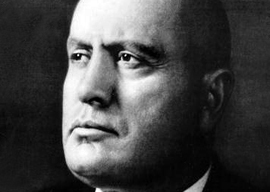
February 24, 2018

Benito Mussolini
Source: Wikimedia Commons
Gstaad—It was nostalgia time at Prince Victor Emmanuel’s birthday party here, with many old friends reminiscing about our youthful shenanigans in times gone by. Victor—the pretender to the Italian throne—and I go back a long way, more than sixty years. In a very roundabout manner, so do our families. His namesake and grandfather, King Victor Emmanuel, facilitated Benito Mussolini’s rise to power, although he was the one who dismissed him in August 1943 and declared Italy no longer a combatant. My mother’s youngest brother, at age 12, had written the Duce a fan letter. Benito invited him to visit Italy as the Duce’s guest, and sure enough my uncle went and stayed with him in Villa Torlonia for a fortnight. Ironically, he fought against the Italians in Albania and died of his wounds after the war. Victor and I have talked about this many times, and both of us remain admirers of the Duce—up to a point, that is.
Back then, nationalism was what counted. Nationalism and patriotism were one and the same. Today both words are considered suspect, as a Trump-like gaucherie, something that only an unsophisticated rube can believe in. Sovereignty ditto. We are, or so they tell us, one big family, and those three words are bad for the common good. Davos man is the type who frowns on nationalism-patriotism, the man being a paragon of neoliberalism and a paid-off member of the globally networked elite. The D-man would sell his mother for a shekel, and his country for an even lower price. When lost in the mists of alcohol, I dream of my perfect state, which is Sparta, and wonder how Davos man would deal with it. Knowing how slick and lubricious the D-man is—a cross between Anna Soubry and Jean-Claude Juncker—the Swiss should name the convention center in Davos after Ephialtes, the traitor who led the Persians to the path behind the gallant 300 at Thermopylae.
The Spectator’s ex-editor Boris got it right when he said that if we’re going to accept laws, we have to know who is making them. Not some faceless, unelected bureaucrat in Brussels, but someone we can vote out the next time. This is where the falseness of the argument against Brexit stands out, the “contemptus mundi” of the self-proclaimed elites. How can unelected bureaucrats of the E.U. accuse Poland and Hungary and the Visegrad states of being undemocratic when their leaders have all been elected democratically? If this isn’t 1984, what is? (And how can Israel accuse Poland of complicity in the Holocaust—the Poles were victims—while running the largest concentration camp in the world, Gaza?) How can George Soros undermine Balkan countries with his billions and go after the democratically elected Viktor Orban when he couldn’t get elected water boy for an all-girls tiddlywinks team? And what’s he doing undermining the will of the British people with paid clowns like this Malloch-Brown fellow? Georgie Porgie wants a borderless Europe, but he ain’t gonna get it, billions or no billions, and he won’t get it because it is unnatural. The betrayal of Germany by Angela Merkel—I see a Muslim takeover of Germany through 10–1 breeding in perhaps as soon as fifty years—is a lesson for all of us. The Italian people have seen the light, as have the Greeks, but Brussels is a hard nut to crack and it has the media behind it. The latter are so consumed with rage against Trump, they made a heroine of little rocket man’s sister. Forget about the mass tortures and starvations and murders of his people. If Trump dislikes the little rocket man, he must be good.
Recovering in my chalet after Victor Emmanuel’s party, I happened on a wonderful film, Suite Française, an adaptation of the tragic Irene Nemirovsky novel of the same name. She never finished her novel—she was arrested for being Jewish and murdered in a camp—so the movie does it for her. I had read it when it was discovered in 2004, and I was not disappointed. The love affair between a French beauty and a wonderful German officer rings true, as does the pettiness and hatred of the French bourgeoisie and peasantry. One thing that struck me that the director got right was the politeness of the Wehrmacht officers, as well as the looks of the German soldiers. I was 4 when they came to occupy our house in Athens, and I remember Major Henry Murgen very well. He was charming and played with me and told me all about his own boys, and I can still smell the leather and see the brilliance of his boots and belts. He was tall, blond, and handsome, as were the majority of Germans at the time. Films nowadays portray them as bullet-headed Slavs, but I was there; modern Hollywood types were not.
Never mind. The national idea is as natural as loving one’s children. D-man and Georgie Porgie don’t like it, so it’s up to us to overcome their billions with willpower and—dare I say it—violence if necessary. We won at the ballot box, and the losers are crying foul. They do exactly this in Africa and in small South American countries. Also in Britain.